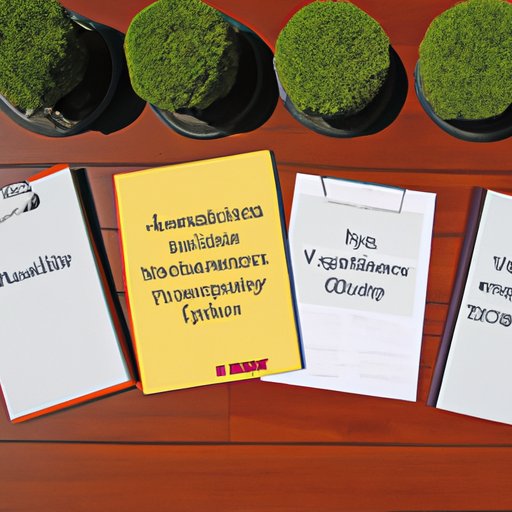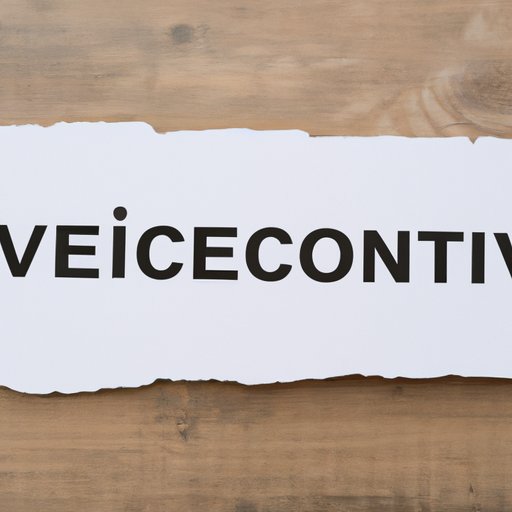Introduction: Exploring the Meaning of Vacating a Court Case
When a court case is vacated, it means that the court’s decision in the case has been reversed or annulled. The term ‘vacate’ is used to describe the legal process of cancelling an earlier court ruling. This process can be voluntary or involuntary, depending on the circumstances. In either case, it means that the original court order is no longer valid, and the parties involved must start the legal process from scratch.

The Legal Process Behind Vacating a Court Case
To understand what it means when a court case is vacated, it is important to first look at the legal process behind it. Vacating a court case is not a simple or straightforward process. It requires careful consideration of the facts and circumstances surrounding the case, as well as an understanding of the applicable laws.
Overview of the Legal Procedure
The process of vacating a court case begins with the filing of a motion. A motion is a formal request to the court to take a specific action. In this case, the motion will ask the court to reverse or annul its previous decision. The motion must include clear and convincing evidence that the court’s original decision was wrong. If the court finds that there is sufficient evidence to support the motion, it will grant the motion and vacate the court case.
How is a Court Case Vacated?
Once the court grants the motion to vacate the court case, the court’s decision is officially vacated. This means that the court’s previous decision is no longer valid, and the parties involved must start the legal process from scratch. Depending on the circumstances, the court may also issue an order that outlines the next steps that need to be taken in order for the case to proceed.
Examining the Reasons for Vacating a Court Case
There are many different reasons why a court case may be vacated. It is important to understand the specific reasons in order to determine if vacating the court case is the best course of action.
Common Reasons for Vacating a Court Case
One of the most common reasons for vacating a court case is a change in the law. If a new law is enacted that affects the outcome of a court case, the court may vacate the original decision and require the parties to start the legal process from scratch. Additionally, changes in the evidence or testimony presented during the trial can also lead to a court case being vacated. This could include new evidence or testimony that was not available at the time of the original trial. Finally, procedural errors can also lead to a court case being vacated. For example, if the court failed to follow proper procedure or made an incorrect ruling, the court may vacate its decision.
Differentiating between Voluntary and Involuntary Vacation of Court Cases
It is also important to distinguish between voluntary and involuntary vacation of court cases. A voluntary vacation occurs when both parties agree to vacate the court case, usually as part of a settlement agreement. An involuntary vacation occurs when one of the parties files a motion to vacate the court case, and the court grants the motion.
How Does Vacating a Court Case Affect Those Involved?
Vacating a court case can have significant implications for those involved. It is important to understand the potential implications before deciding whether to vacate a court case.
Implications for the Parties Involved
For the parties involved, vacating a court case can be a lengthy and expensive process. All of the evidence and testimony that was presented during the original trial must be re-examined and re-litigated. This can lead to additional costs and delays in resolving the dispute. Additionally, vacating a court case can also be emotionally draining for the parties involved, as they must relive their experiences during the trial.
Consequences of Vacated Court Cases
In addition to the implications for the parties involved, vacating a court case can also have wider consequences. According to a study conducted by the University of Michigan Law School, vacating a court case can lead to a decrease in public confidence in the judicial system. This can have a negative impact on people’s willingness to participate in the legal process. Additionally, vacating a court case can also result in confusion and uncertainty about the law, as the original court decision is no longer valid.
Comparing the Consequences of Vacating a Court Case versus Other Resolutions
When considering whether to vacate a court case, it is important to compare the consequences of vacating a court case versus other possible resolutions. This will help ensure that the best decision is made for all parties involved.
Advantages and Disadvantages of Vacating a Court Case
Vacating a court case offers several potential advantages. For example, vacating a court case can provide a fresh opportunity for the parties to reach a resolution that is mutually beneficial. Additionally, vacating a court case can also provide an opportunity to re-examine the evidence and testimony presented during the trial, which could lead to a more accurate outcome. On the other hand, vacating a court case can be costly and time consuming, and can lead to decreased public confidence in the judicial system.
Alternatives to Vacating a Court Case
Vacating a court case is not the only option available to the parties involved. Other possible resolutions include mediation and arbitration, pre-trial negotiations, and settlement agreements. Each of these options offers its own advantages and disadvantages, and should be carefully considered before a decision is made.

Understanding the Different Types of Vacated Court Cases
It is also important to understand the different types of vacated court cases. Each type of court case has its own unique set of rules and procedures, which must be followed in order for the case to be vacated.
Civil Cases
Civil cases involve disputes between two or more private parties. These cases typically involve issues such as contracts, property ownership, and personal injury. When a civil case is vacated, the court’s decision is no longer valid and the parties must start the legal process from scratch.
Criminal Cases
Criminal cases involve disputes between the government and an individual accused of a crime. When a criminal case is vacated, the court’s decision is no longer valid and the individual must be re-tried in accordance with the law. Additionally, any sentence imposed by the court is also vacated.

Investigating Best Practices for Vacating a Court Case
It is important to understand the best practices for vacating a court case. These best practices will help ensure that the process is handled properly and that the rights of all parties involved are protected.
Pre-trial Negotiations
Before filing a motion to vacate a court case, it is often beneficial to engage in pre-trial negotiations. This allows the parties to explore potential resolutions without having to go through the full legal process. Additionally, pre-trial negotiations can also help reduce the costs associated with vacating a court case.
Mediation and Arbitration
Mediation and arbitration are two alternative dispute resolution methods that can be used to resolve disputes without going to court. These methods allow the parties to come to an agreement outside of the court system, which can help avoid the costs and delays associated with vacating a court case.
Settlement Agreements
Settlement agreements are another way to resolve disputes without going to court. In a settlement agreement, the parties agree to settle the dispute without involving the court. This can help avoid the costs and delays associated with vacating a court case.
Conclusion: Vacating a Court Case – Making an Informed Decision
Vacating a court case is a complex process with significant implications for those involved. Before making a decision to vacate a court case, it is important to consider all of the potential consequences, as well as the alternatives. Additionally, it is important to understand the legal process behind vacating a court case, as well as the best practices for doing so. By taking the time to understand the process, the parties involved can make an informed decision that is in the best interests of all involved.
Key Takeaways
Vacating a court case means that the court’s decision in the case has been reversed or annulled. The process of vacating a court case can be voluntary or involuntary and can have significant implications for those involved. It is important to understand the legal process behind vacating a court case, as well as the potential consequences and alternatives. Additionally, it is important to understand the best practices for vacating a court case in order to ensure that the process is handled properly.
Summary of Important Considerations
When considering whether to vacate a court case, it is important to consider the potential implications for all parties involved, as well as the alternatives. Additionally, it is important to understand the legal process behind vacating a court case and the best practices for doing so. Taking the time to understand the process will help ensure that the best decision is made for all involved.
(Note: Is this article not meeting your expectations? Do you have knowledge or insights to share? Unlock new opportunities and expand your reach by joining our authors team. Click Registration to join us and share your expertise with our readers.)
